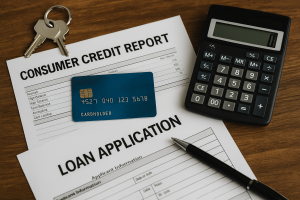Building credit from scratch can feel like a daunting task, especially if you are new to the financial system in the USA. However, establishing a good credit history is crucial for securing loans, renting apartments, and even landing certain jobs.
In this guide, we will walk you through the steps to start building your credit profile effectively and responsibly.
Why having a credit history matters

Building a reputable credit history is essential for financial independence. Without a solid credit score, you may struggle to qualify for loans or credit cards, or you may face higher interest rates and larger down payments. Credit history is a measure of your financial reliability and is taken seriously by lenders, landlords, and employers alike.
A good credit score can open doors to lower interest rates on loans, better credit card offers, and even better auto insurance rates. It reflects your ability to manage debt responsibly and can be a powerful tool if leveraged correctly. Understanding the importance of a solid credit history can motivate you to take the necessary steps to build and maintain a good score.
How is credit score calculated?
Understanding how your credit score is calculated is essential for managing it effectively. Credit scores are determined using several factors, including payment history, amounts owed, length of credit history, types of credit used, and new credit inquiries.
Your payment history accounts for the largest portion of your credit score. Paying bills on time, every time, is a sure way to maintain a strong score. The amounts owed reflect how much of your available credit you’re currently using.
The length of your credit history is also important, as longer histories tend to result in higher scores. Diversifying your credit portfolio with various types will show lenders your ability to manage different kinds of debt responsibly.
Common credit score ranges
Credit score ranges provide insight into how lenders view your creditworthiness. Scores typically range from 300 to 850, with higher scores indicating better creditworthiness. A score below 580 is considered very poor, while 580 to 669 is fair.
Scores from 670 to 739 are good, while those from 740 to 799 are very good. A score of 800 and above is considered exceptional. Striving for a higher score can result in better interest rates and more favorable loan terms. Knowing where you stand can help you identify areas for improvement and set realistic goals for building your credit over time.
Steps to establish your credit from scratch
If you are starting from zero, it’s essential to take specific steps to build a strong credit foundation. Here are a few key steps to get you started on the right track. First, consider applying for a secured credit card.
Secured cards require a security deposit, which serves as your credit limit. This allows you to build a credit history without the risk typically associated with unsecured cards. Second, become an authorized user on someone else’s credit card.
Make sure to use the card responsibly while benefiting from their good credit history. Third, take out a small credit-builder loan from a bank or credit union which is specifically designed to help people establish a credit history.
Utilizing secured credit cards
Secured credit cards are an excellent way to build credit with minimal risk. These cards require a security deposit that serves as your credit limit. By using the card for small, manageable purchases and paying off the balance in full every month, you can build a positive payment history.
Most secured cards report your payment activity to major credit bureaus, which helps improve your credit score over time. Make sure to choose a secured card with low fees and interest rates to ensure that it remains an affordable option for you. With consistent and responsible use, you can eventually transition to an unsecured credit card, further boosting your credit profile.
Considering credit-builder loans
Another useful tool for building credit is a credit-builder loan. Offered primarily by credit unions and community banks, these loans place the borrowed amount in a savings account, which you cannot access until the loan is paid off.
Making timely payments on a credit-builder loan can significantly boost your credit history. Since these payment activities are reported to the credit bureaus, they help demonstrate your ability to handle debt responsibly.
These loans usually come in small amounts and are designed specifically to help individuals establish or rebuild their credit. After you’ve paid off the loan, you’ll gain access to the savings account balance, which can be a rewarding end to your credit-building journey.






